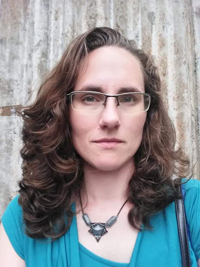HKU Alumni Stories: An Interview with Carmen Tomfohrde
Interviewed by Giulia Usai

After earning an M.A. and a Ph.D. from HKU, Carmen Tomfohrde has become part of the HKU Centre for the Humanities and Medicine. In this interview, she shares her experience as former HKU student, gives some advice to current MPhils and PhDs, and recounts the steps of her research and career path, which has taken her from the United States to Hong Kong and to different islands of Polynesia.
– Why did you decide to pursue your postgraduate studies in Hong Kong? Was your choice encouraged by people around you?
I was already in Hong Kong, working as the developer of a Learning Resources Center, when I learned about the part-time Master’s degree in the School of English. The course offerings and their reading lists sparked my interest, and I was intrigued by the possibility of doing an interdisciplinary thesis in Art History and English Studies. I was enabled by the structure of the program, with evening classes (I needed to maintain my full-time job during my Master’s degree). My fantastic experience in the M.A. program was one factor among many that compelled me to choose HKU for my Ph.D., and the HKPF fellowship made it possible for me. I consulted several mentors while deliberating prospects for a Ph.D., and received a spectrum of advice. Some were supportive of my choice and others thought I was making the wrong decision. I weighed options and input, and ultimately pursued what I thought would be the best fit.
– Did you find any significant differences in the education system, in the way professors interact with and relate to students in comparison to your previous academic experience?
I did my Bachelor’s degree at a small, highly focused, and competitive private art college in the U.S. As an undergraduate, I enjoyed intensive mentorship and opportunities to work part-time, including as a writing tutor and as Assistant to the Chair of Fine Arts. While professors at large research institutions juggle multiple commitments and the continual pressure to produce impactful research, necessarily limiting the one-on-one time undergraduates are able to spend with them, my postgraduate experience at HKU included mentorship from professors in multiple departments. I owe them my heartfelt thanks for their support over the years.
– What was your research about? Do you think that HKU facilities and funding have given you the opportunity to fully develop your research possibilities?
My interdisciplinary research focused on the impacts of Christian missionaries in Polynesia. During a short period of time in the nineteenth century, the majority of entire island populations converted to Christianity, and most Polynesians self-identify as Christian approximately two centuries later. I took seven research trips for conference presentations, archival research, to serve as a guest lecturer in Tonga, and to contribute to museum development in the Marquesas, French Polynesia. The HKPF fellowship made it possible, but I had to self-fund some travel. Inter-library loan arrangements brought in obscure books not available in Hong Kong, and many archival materials are becoming available online (hat tip to Hawaiian Mission Houses Historic Site and Archives in particular for their digitization projects!), which helped reduce the costs of archival research.
– What advice would you give to current PhD students with regards to research, life in Hong Kong, HKU academic life?
Cultivate a hobby! Develop some off-campus exterior dimension, so your research does not consume you. When the core of a person’s work is intellectual, it is hard to develop work-life separation. I found it immensely important to get involved in the lives of the people of Hong Kong. I have increasingly realized the importance of community. There are many wonderful people with brilliant minds at HKU, but it is also important to spend meaningful time with people outside the Ivory Tower.
– Congratulations on finding a new job in HKU. What does your job entail? Were you determined to move back to Hong Kong, or did it happen by chance?
I serve as Executive Officer in the Centre for the Humanities and Medicine. This cutting-edge interdisciplinary research unit serves as a hub networking academics in the arts and medical fields, with particular expertise on biotechnology and epidemics. My duties fall under the general headers of Finance, HR, PR, office management / institutional development, and event management. Having developed a Learning Resources Center in Hong Kong prior to my Ph.D., I am able to activate dual backgrounds as a project manager and academic as I contribute to the growth of the Centre. I returned to the U.S. between submitting my final dissertation and graduating. By then, I had lived in Hong Kong for more than a decade, and needed some time to reconnect with family and friends in the United States. Although I also considered job offers in other locations, I wanted to return to Hong Kong; I love it here, and I am delighted to be back at HKU.
– What are your future academic plans?
Never stop learning.

Our apologies, you must be logged in to post a comment.